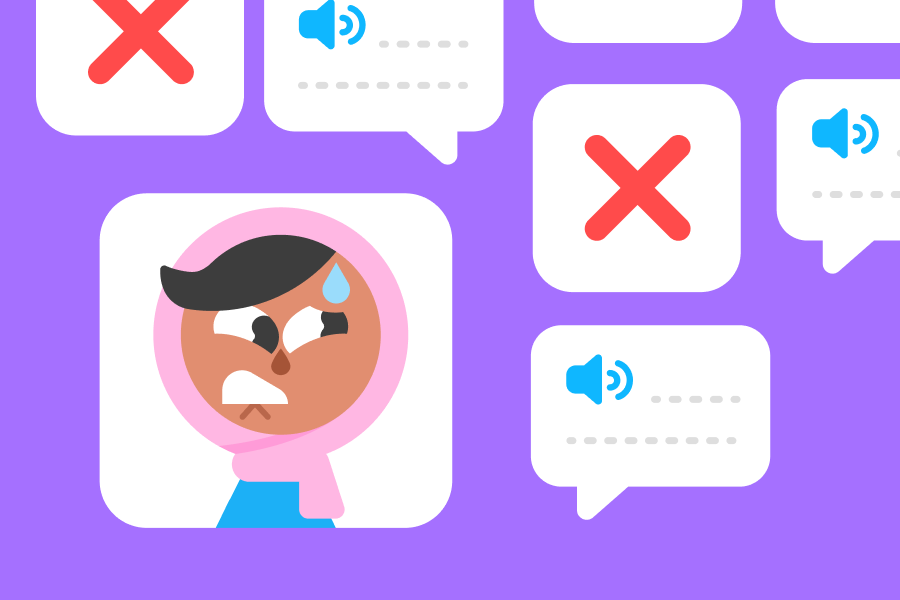Over the last 25 years, I have studied more than 20 languages and have made languages my career—but I still make mistakes and sometimes mix my languages.
And that’s a good thing! I learn a lot from reflecting on my errors—there is a reason behind each of them—and becoming aware of that reason makes me excited to continue learning.
Here are 5 mistakes I still make:
1. English vowels
My native language is French, and English was the next language I learned—and even after 30 years, I still occasionally mix up English vowels. This is especially true for vowels you make in the center and back of the mouth, like the vowels in but, boat, and bought. For example, I may say collar when I mean color, or I may accidentally pronounce the "o" in posture like the "o" in post. This is because French doesn't have as many vowels in these parts of the mouth as American English. After working on this actively for years, I now get it right most of the time, but I still don’t make these sounds as consistently as someone who grew up speaking English… and I’m OK with that!
2. Spanish tens
One of my most prominent blunders these days is mispronouncing the tens (20, 30, 40, etc, to 90) when I speak Spanish. Instead of saying the -enta ending (as in cuarenta for "forty"), I use -anta as the ending. It can be frustrating that I have to focus so much to only *sometimes* get this right, but it's just my brain applying another rule it learned years before I spoke Spanish: -anta is indeed the correct ending for tens… in Italian, another language I speak! This is a classic case of language interference.
3. Italian stare
The Italian verb stare literally means "to be," and it is usually restricted to asking how someone is doing (Come stai? for "How are you?") and describing an action that is happening right now (Sto scrivendo un articolo for "I’m writing an article"). But over the past few years, I’ve found myself wanting to use stare all over the place, especially to ask where things are. So instead of Dov’è il libro? (Where is the book) with the verb essere (another way to say "to be"), I want to ask Dove sta il libro? This would be fine in some dialects of Italian, but in standard Italian—the only variety I’ve studied—you use essere and not stare.
So why do I do this? Some of you may have already guessed it: It's due to the influence of Spanish and Portuguese! Both of them have a verb estar (a cognate of Italian stare), which is typically used to ask where things are located. Another perfectly normal case of language interference!
4. Basque ni vs. nik
I started learning Basque a few months ago and it has been a blast! It's spoken in northern Spain and southwestern France and isn't related to any other language. One thing I did not expect to struggle with when I first started is how to say “I”... Basque uses different words for "I" depending on the sentence! Basque is an ergative language: It treats the subjects of transitive verbs (like "to want") differently from intransitive verbs (like "to go"), so in Basque, the subject of I go to the beach every day is ni, and the subject of I want to eat pintxos is nik. Basque is the first ergative language I've studied, and I can feel my brain working hard not only to create these new categories but also to retrieve that information instantly when I form sentences. Thank you, brain!
5. Maltese verbs
Maltese is a fascinating language: It's spoken in Malta (located between Sicily and Tunisia), and evolved from contact between Arabic and Romance languages, as well as English. I’ve studied Maltese for a couple of years now, and it's been a huge help to know multiple varieties of Arabic, in addition to Italian and English. One of the biggest challenges for me is using the correct vowels in verbs. There are different vowels in different verbs—it's an "a" in jagħmlu (they do) but an "e" in jegħlbu (they overcome)—and some verbs need a helping vowel in the middle of the word (like in jitilfu for "they lose"), whereas most other verbs don’t.
Some of the patterns make sense for historical reasons, but not all of it makes sense *to me* yet! What my brain still needs is lots and lots of exposure. In the meantime, I’ll proudly speak this new (to me) language and embrace my mistakes while I do!
Now, go make some mistakes!
Making mistakes is a natural part of learning—it's just how our brains work!—and they contribute to an exciting language adventure, complete with amusing mistakes along the way. For me, taking the time to understand a mistake makes it easier to accept it and to appreciate all the unseen work my brain is doing to make this learning possible. 🧠



